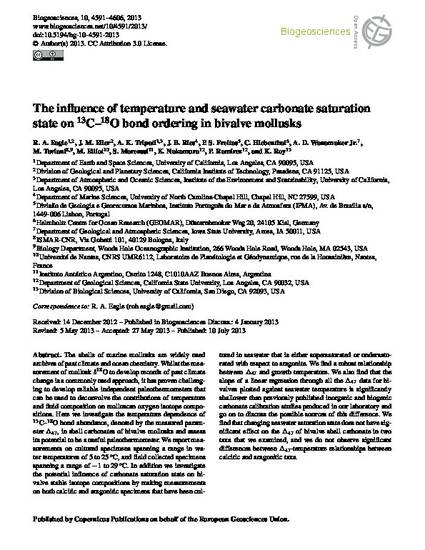
The shells of marine mollusks are widely used archives of past climate and ocean chemistry. Whilst the measurement of mollusk δ18O to develop records of past climate change is a commonly used approach, it has proven challenging to develop reliable independent paleothermometers that can be used to deconvolve the contributions of temperature and fluid composition on molluscan oxygen isotope compositions. Here we investigate the temperature dependence of 13C–18O bond abundance, denoted by the measured parameter Δ47, in shell carbonates of bivalve mollusks and assess its potential to be a useful paleothermometer. We report measurements on cultured specimens spanning a range in water temperatures of 5 to 25 °C, and field collected specimens spanning a range of −1 to 29 °C. In addition we investigate the potential influence of carbonate saturation state on bivalve stable isotope compositions by making measurements on both calcitic and aragonitic specimens that have been cultured in seawater that is either supersaturated or undersaturated with respect to aragonite. We find a robust relationship between Δ47 and growth temperature. We also find that the slope of a linear regression through all the Δ47 data for bivalves plotted against seawater temperature is significantly shallower than previously published inorganic and biogenic carbonate calibration studies produced in our laboratory and go on to discuss the possible sources of this difference. We find that changing seawater saturation state does not have significant effect on the Δ47 of bivalve shell carbonate in two taxa that we examined, and we do not observe significant differences between Δ47-temperature relationships between calcitic and aragonitic taxa.
Available at: http://works.bepress.com/alan-wanamaker/15/

This article is published as Eagle, R. A., John M. Eiler, Aradhna K. Tripati, J. B. Ries, P. S. Freitas, Claas Hiebenthal, Alan D. Wanamaker et al. "The influence of temperature and seawater carbonate saturation state on 13C-18O bond ordering in bivalve mollusks." Biogeosciences 10, no. 7 (2013). doi: 10.5194/bg-10-4591-2013. Posted with permission.